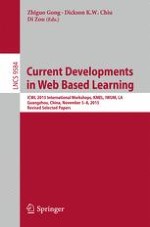2016 | Book
Current Developments in Web Based Learning
ICWL 2015 International Workshops, KMEL, IWUM, LA, Guangzhou, China, November 5-8, 2015, Revised Selected Papers
Editors: Zhiguo Gong, Dickson K. W. Chiu, Di Zou
Publisher: Springer International Publishing
Book Series : Lecture Notes in Computer Science
